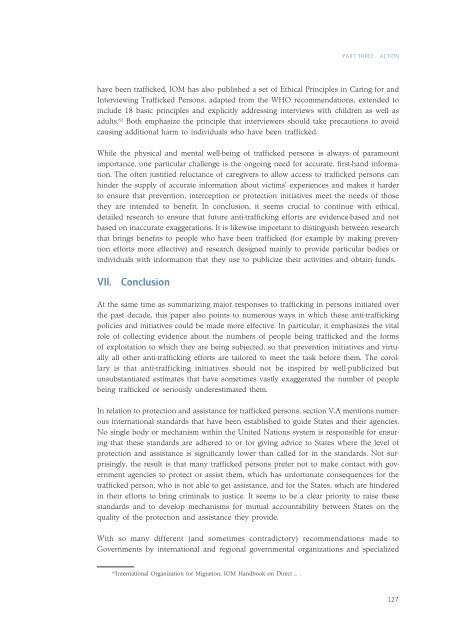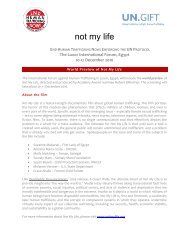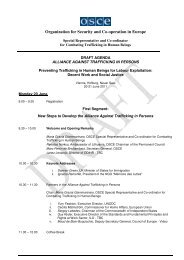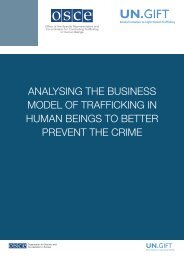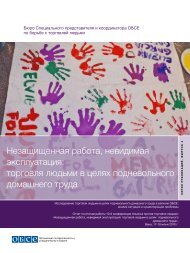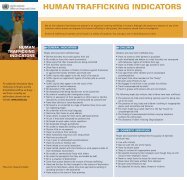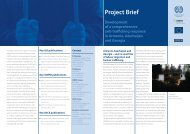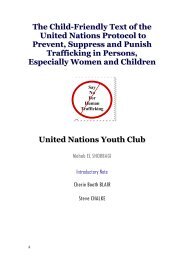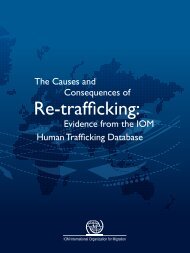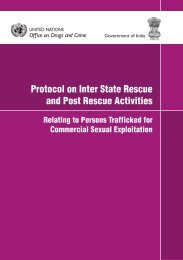An Introduction to Human Trafficking - United Nations Office on ...
An Introduction to Human Trafficking - United Nations Office on ...
An Introduction to Human Trafficking - United Nations Office on ...
Create successful ePaper yourself
Turn your PDF publications into a flip-book with our unique Google optimized e-Paper software.
PART THREE.—ACTION<br />
have been trafficked. IOM has also published a set of Ethical Principles in Caring for and<br />
Interviewing Trafficked Pers<strong>on</strong>s, adapted from the WHO recommendati<strong>on</strong>s, extended <str<strong>on</strong>g>to</str<strong>on</strong>g><br />
include 18 basic principles and explicitly addressing interviews with children as well as<br />
adults. 62 Both emphasize the principle that interviewers should take precauti<strong>on</strong>s <str<strong>on</strong>g>to</str<strong>on</strong>g> avoid<br />
causing additi<strong>on</strong>al harm <str<strong>on</strong>g>to</str<strong>on</strong>g> individuals who have been trafficked.<br />
While the physical and mental well-being of trafficked pers<strong>on</strong>s is always of paramount<br />
importance, <strong>on</strong>e particular challenge is the <strong>on</strong>going need for accurate, first-hand informati<strong>on</strong>.<br />
The often justified reluctance of caregivers <str<strong>on</strong>g>to</str<strong>on</strong>g> allow access <str<strong>on</strong>g>to</str<strong>on</strong>g> trafficked pers<strong>on</strong>s can<br />
hinder the supply of accurate informati<strong>on</strong> about victims’ experiences and makes it harder<br />
<str<strong>on</strong>g>to</str<strong>on</strong>g> ensure that preventi<strong>on</strong>, intercepti<strong>on</strong> or protecti<strong>on</strong> initiatives meet the needs of those<br />
they are intended <str<strong>on</strong>g>to</str<strong>on</strong>g> benefit. In c<strong>on</strong>clusi<strong>on</strong>, it seems crucial <str<strong>on</strong>g>to</str<strong>on</strong>g> c<strong>on</strong>tinue with ethical,<br />
detailed research <str<strong>on</strong>g>to</str<strong>on</strong>g> ensure that future anti-trafficking efforts are evidence-based and not<br />
based <strong>on</strong> inaccurate exaggerati<strong>on</strong>s. It is likewise important <str<strong>on</strong>g>to</str<strong>on</strong>g> distinguish between research<br />
that brings benefits <str<strong>on</strong>g>to</str<strong>on</strong>g> people who have been trafficked (for example by making preventi<strong>on</strong><br />
efforts more effective) and research designed mainly <str<strong>on</strong>g>to</str<strong>on</strong>g> provide particular bodies or<br />
individuals with informati<strong>on</strong> that they use <str<strong>on</strong>g>to</str<strong>on</strong>g> publicize their activities and obtain funds.<br />
VII.—C<strong>on</strong>clusi<strong>on</strong><br />
At the same time as summarizing major resp<strong>on</strong>ses <str<strong>on</strong>g>to</str<strong>on</strong>g> trafficking in pers<strong>on</strong>s initiated over<br />
the past decade, this paper also points <str<strong>on</strong>g>to</str<strong>on</strong>g> numerous ways in which these anti-trafficking<br />
policies and initiatives could be made more effective. In particular, it emphasizes the vital<br />
role of collecting evidence about the numbers of people being trafficked and the forms<br />
of exploitati<strong>on</strong> <str<strong>on</strong>g>to</str<strong>on</strong>g> which they are being subjected, so that preventi<strong>on</strong> initiatives and virtually<br />
all other anti-trafficking efforts are tailored <str<strong>on</strong>g>to</str<strong>on</strong>g> meet the task before them. The corollary<br />
is that anti-trafficking initiatives should not be inspired by well-publicized but<br />
unsubstantiated estimates that have sometimes vastly exaggerated the number of people<br />
being trafficked or seriously underestimated them.<br />
In relati<strong>on</strong> <str<strong>on</strong>g>to</str<strong>on</strong>g> protecti<strong>on</strong> and assistance for trafficked pers<strong>on</strong>s, secti<strong>on</strong> V.A menti<strong>on</strong>s numerous<br />
internati<strong>on</strong>al standards that have been established <str<strong>on</strong>g>to</str<strong>on</strong>g> guide States and their agencies.<br />
No single body or mechanism within the <str<strong>on</strong>g>United</str<strong>on</strong>g> <str<strong>on</strong>g>Nati<strong>on</strong>s</str<strong>on</strong>g> system is resp<strong>on</strong>sible for ensuring<br />
that these standards are adhered <str<strong>on</strong>g>to</str<strong>on</strong>g> or for giving advice <str<strong>on</strong>g>to</str<strong>on</strong>g> States where the level of<br />
protecti<strong>on</strong> and assistance is significantly lower than called for in the standards. Not surprisingly,<br />
the result is that many trafficked pers<strong>on</strong>s prefer not <str<strong>on</strong>g>to</str<strong>on</strong>g> make c<strong>on</strong>tact with government<br />
agencies <str<strong>on</strong>g>to</str<strong>on</strong>g> protect or assist them, which has unfortunate c<strong>on</strong>sequences for the<br />
trafficked pers<strong>on</strong>, who is not able <str<strong>on</strong>g>to</str<strong>on</strong>g> get assistance, and for the States, which are hindered<br />
in their efforts <str<strong>on</strong>g>to</str<strong>on</strong>g> bring criminals <str<strong>on</strong>g>to</str<strong>on</strong>g> justice. It seems <str<strong>on</strong>g>to</str<strong>on</strong>g> be a clear priority <str<strong>on</strong>g>to</str<strong>on</strong>g> raise these<br />
standards and <str<strong>on</strong>g>to</str<strong>on</strong>g> develop mechanisms for mutual accountability between States <strong>on</strong> the<br />
quality of the protecti<strong>on</strong> and assistance they provide.<br />
With so many different (and sometimes c<strong>on</strong>tradic<str<strong>on</strong>g>to</str<strong>on</strong>g>ry) recommendati<strong>on</strong>s made <str<strong>on</strong>g>to</str<strong>on</strong>g><br />
Governments by internati<strong>on</strong>al and regi<strong>on</strong>al governmental organizati<strong>on</strong>s and specialized<br />
62<br />
Internati<strong>on</strong>al Organizati<strong>on</strong> for Migrati<strong>on</strong>, IOM Handbook <strong>on</strong> Direct … .<br />
127


